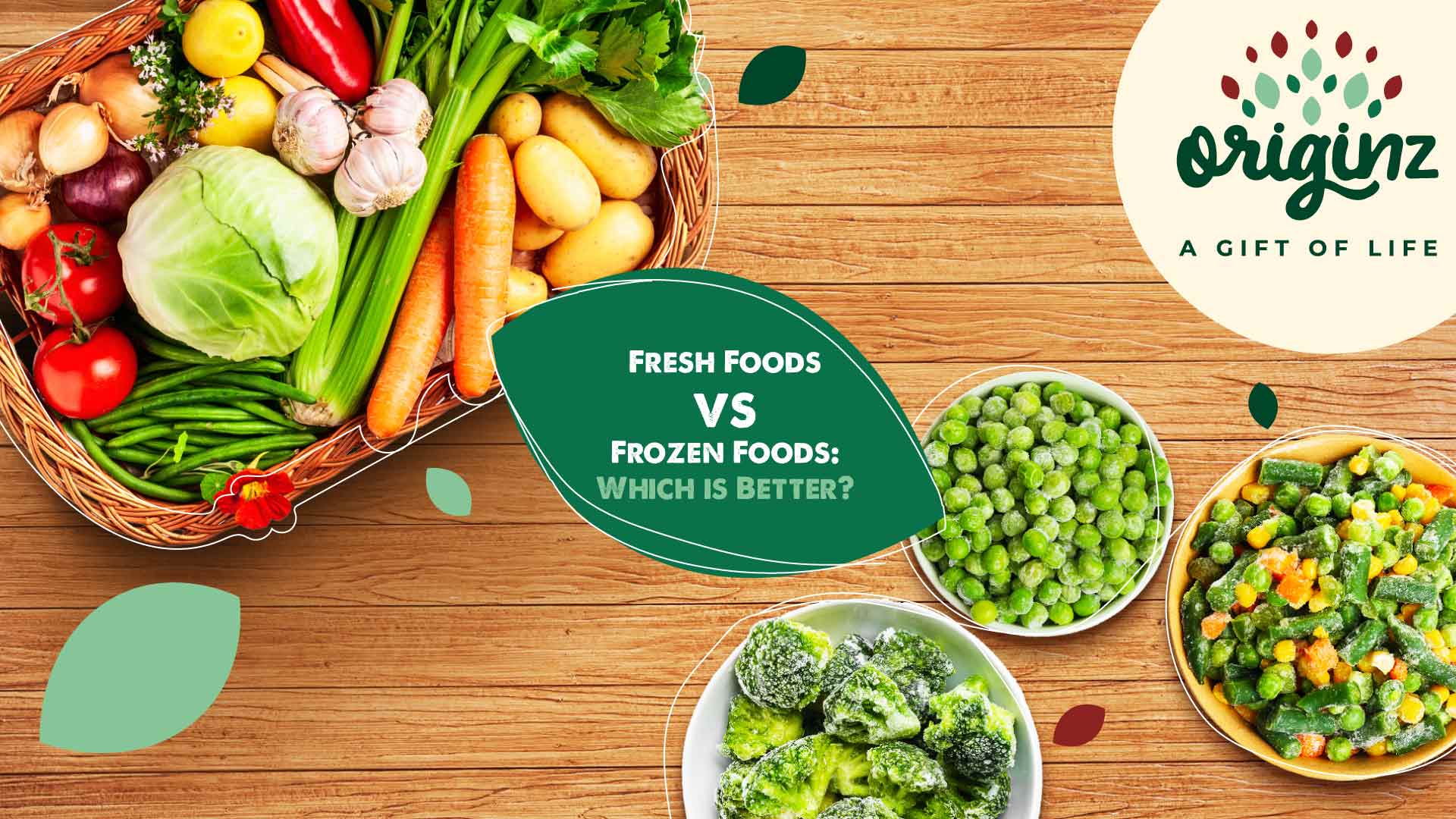
Fresh Foods vs Frozen Foods: Which is Better?
In the dynamic landscape of nutrition and healthy eating, the ongoing debate surrounding fresh foods vs frozen foods reflects the evolving preferences and priorities of the modern-day consumer. The sheer abundance of choices in today's markets can make it challenging for individuals to recognize which option is better for their dietary needs. In this blog, we will dissect the nutritional content, culinary versatility, and health impact of each option, so as to empower you with the knowledge necessary to make an informed decision. We will strive to provide a comprehensive understanding of the intricacies involved in choosing between fresh and frozen foods, ultimately guiding you toward a path of healthier and more mindful eating.
Fresh Food Benefits:
Fresh foods, straight from the farm or market, are often celebrated for their vibrant colours, crisp textures, and the belief that they contain higher nutrient levels. Fresh fruits and vegetables are at their peak when consumed shortly after harvest, ensuring that you get the maximum nutritional value. The process of picking, transporting, and storing fresh produce plays a crucial role in preserving its nutritional content.
One of the key fresh food benefits is their versatility. Fresh ingredients can be enjoyed in various ways, from raw salads to grilled dishes, providing a wide range of culinary options. Additionally, the flavour of fresh produce is often praised for being more robust and authentic, making it a favourite among food enthusiasts.
Difference between Frozen and Fresh Vegetables:
The battle between fresh and frozen vegetables is a hot topic, and understanding the differences can help you make informed choices for your meals. Fresh vegetables are, as the name suggests, harvested and consumed shortly thereafter. This minimizes the time between harvesting and consumption, preserving the nutritional content and flavour.
On the other hand, frozen vegetables undergo a process of blanching before freezing, which can lead to a loss of some water-soluble vitamins. However, the freezing process also helps lock in nutrients, preventing further degradation. The convenience of frozen vegetables cannot be overstated - they are available year-round, require less prep time, and have a longer shelf life compared to their fresh counterparts.
Benefits of Frozen Fruits and Vegetables:
While fresh foods are often touted for their nutritional superiority, frozen fruits and vegetables have their own set of advantages. Frozen produce is harvested at its peak ripeness, then quickly frozen, preserving the nutrients until the moment of consumption. This ensures that you still get a substantial amount of vitamins and minerals, making frozen options a viable and convenient alternative.
Furthermore, frozen fruits are excellent for smoothies, as they contribute to a thicker and colder consistency without the need for ice. The freezing process also helps break down the cell walls of certain fruits, making them even more accessible for nutrient absorption during digestion.
Things to Consider When Cooking Frozen Vegetables:
While frozen vegetables offer undeniable convenience, there are important considerations to keep in mind when incorporating frozen vegetables into your meals. First and foremost, it's crucial to avoid overcooking, as this can lead to a loss of nutrients. Steaming or microwaving frozen vegetables are generally better options than boiling.
Additionally, be mindful of added ingredients in frozen meals. Some frozen vegetables come with added sauces or seasonings, which can contribute to increased sodium and calorie intake. Opt for plain, unseasoned frozen vegetables to have more control over the flavour and nutritional content of your meals.
FAQs:
Q: Are frozen fruits and vegetables as healthy as fresh ones?
A: Yes, in many cases, frozen fruits and vegetables can be just as healthy as fresh ones. The freezing process helps preserve nutrients, and they are often harvested at peak ripeness.Q: What is the key difference between frozen and fresh vegetables?
A: Fresh vegetables are consumed shortly after harvest, preserving their original state. Frozen vegetables undergo blanching before freezing, which can lead to a loss of some water-soluble vitamins but helps lock in nutrients.Q: How can I ensure that I get the maximum benefits from frozen vegetables?
A: Avoid overcooking to prevent nutrient loss, and opt for plain, unseasoned frozen vegetables to have more control over the flavour and nutritional content of your meals.
Q: Can frozen foods be part of a balanced and healthy diet?
A: Absolutely. Frozen foods, when chosen wisely, can be a convenient and nutritious addition to a balanced diet. Pay attention to ingredients, cooking methods, and portion sizes for optimal health benefits.The debate between fresh foods and frozen foods ultimately comes down to personal preference, lifestyle, and nutritional priorities. Both options offer unique benefits, and a well-balanced diet can incorporate a mix of both. Whether you prioritize the convenience of frozen foods or the sensory experience of fresh produce, making informed choices based on your individual needs is key to achieving a healthy and satisfying diet.
Latest Blogs

Maintaining Healthy Habits After Ramadan
Have Ramadan healthy meals after Ramadan and maintain healthy food habits and implement them in your daily lives. Read more about healthy food habits.

Authentic Middle Eastern Iftar Meals to Prepare This Ramadan
Prepare some authentic middle eastern iftar meals this Ramadan. Look for fresh Ramadan food ideas and make your day memorable with these dishes. Check them out.

Ramadan Dishes to Cure Fasting Fatigue
Don’t worry about fasting fatigue anymore as we have listed some best Ramadan dishes and easy iftar meals to support your fasting journey. Check them out.

Eid-al-Fitr Feast: Delicious Recipes to Celebrate the End of Ramadan
Celebrate the end of Ramadan with delicious recipes on the eve of Eid ul Fitr. Read more about the traditional Ramadan recipes and make them easily.